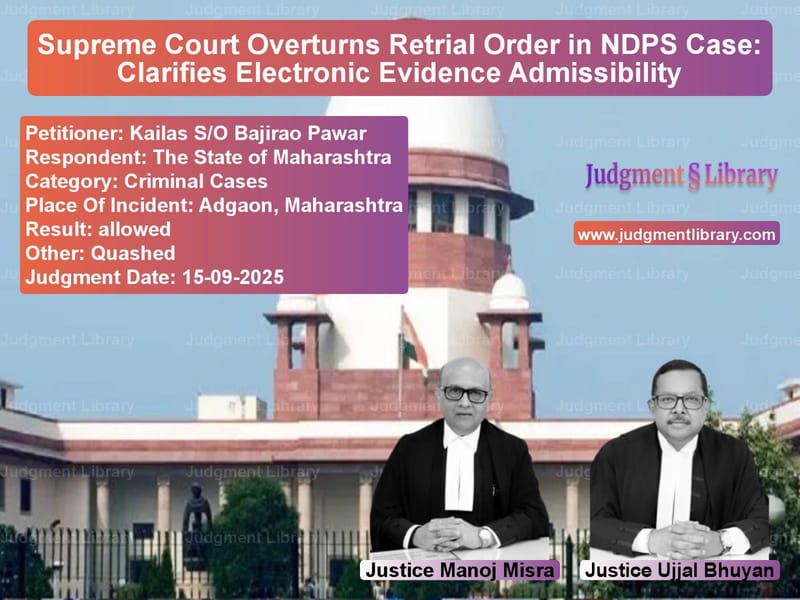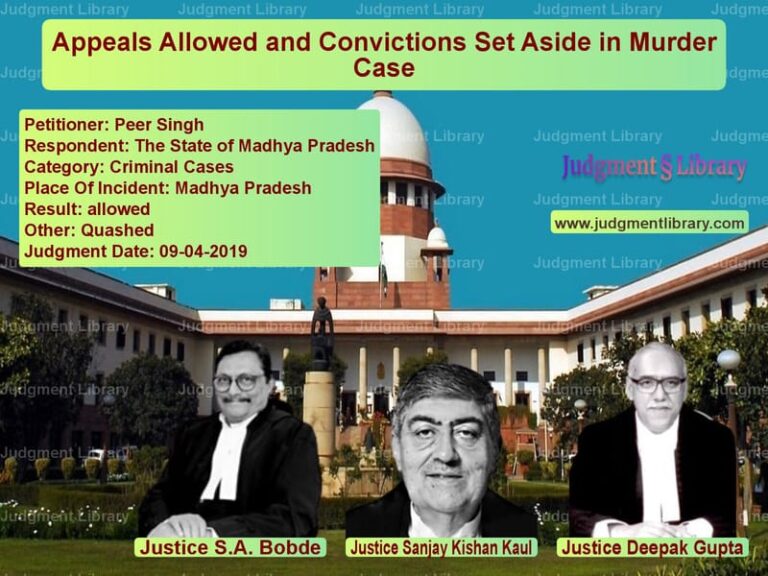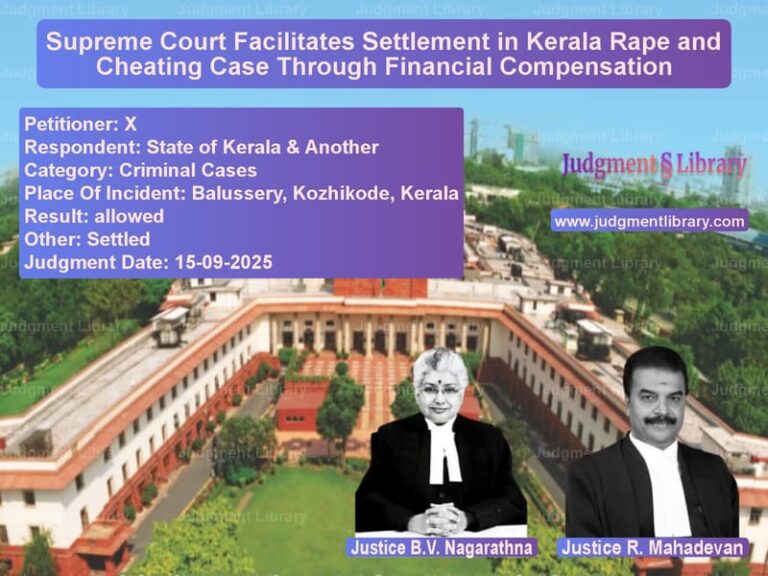Supreme Court Overturns Retrial Order in NDPS Case: Clarifies Electronic Evidence Admissibility
In a significant ruling that clarifies the legal standards for electronic evidence in narcotics cases, the Supreme Court of India recently overturned a Bombay High Court decision that had ordered a fresh trial in a drug possession case. The case involved Kailas Pawar, who was convicted for possession of 39 kilograms of ganja, but saw his conviction set aside and a retrial ordered by the High Court. The Supreme Court’s judgment, delivered on September 15, 2025, provides crucial guidance on when retrials are appropriate and how electronic evidence should be treated in criminal proceedings.
The case began with a police raid on September 23, 2020, when authorities received information about ganja being stored in a hut behind Mari Mata Temple in Adgaon. After following proper procedures including diary entries, written communications to senior officers, and obtaining necessary permissions, a raiding party was assembled comprising police officials, panch witnesses, a photographer, a gazetted officer, and weighing scales. During the raid, the appellant Kailas Pawar and co-accused Raju Motiram Solanke were found sitting in the hut where 18 plastic packets containing ganja weighing 39 kilograms were recovered from a sack. Samples were drawn, sealed, and sent for forensic analysis. Further investigation revealed the involvement of two additional accused, though they were eventually acquitted by the trial court.
The prosecution presented substantial evidence during the trial, including seven witnesses who testified about the search and seizure operation. Crucially, the entire raid had been videographed by photographer Santosh Solanke (SW No. 2), who provided a certificate under Section 65B(4) of the Indian Evidence Act to make the electronic record admissible. The trial court specifically noted in its judgment that the video recording was played in court and viewed by the presiding officer, court staff, the accused persons, and their lawyers. The court observed that no disputes were raised about the contents of the video or the identity of the persons shown in it.
The trial court convicted Kailas Pawar and Raju Solanke, relying on both the substantive oral evidence and the corroborating video evidence. However, when the convicts appealed to the Bombay High Court, the court took a different view of the evidence. The High Court set aside the conviction and ordered a retrial, primarily citing two reasons: that the video evidence had not been properly converted into legally admissible evidence, and that the Chemical Examiner had not been produced as a witness.
The High Court’s reasoning regarding the video evidence was particularly detailed. The court observed: “The video recording of the entire process was the best evidence in the possession of the prosecution. The question that was required to be addressed by the learned Judge while recording such evidence was as to how it has to be converted into legally admissible evidence. The learned Judge and the learned prosecutor have committed a procedural error. The proper procedure has not been followed.” The High Court elaborated that “the witness, after playing the CD, must describe or translate the video recording or the contents of the recording in his own words on oath before the Court” and that this procedure had not been followed.
Aggrieved by the retrial order, Kailas Pawar approached the Supreme Court. His lawyers argued that retrial is an exceptional remedy that should not be granted merely to enable the prosecution to lead evidence it could have but did not care to lead earlier. They relied on established precedents including the Constitution Bench decision in Ukha Kolhe versus State of Maharashtra and the more recent Nasib Singh versus State of Punjab, which emphasize that retrials should only be ordered in exceptional circumstances to prevent miscarriage of justice.
The State of Maharashtra, representing the prosecution, supported the appellant’s position that the High Court had erred in ordering a retrial. The state argued that the video evidence was properly admissible under Section 65B of the Evidence Act since the creator had provided the necessary certificate. They also pointed out that substantial oral evidence supported the recovery, and that the Chemical Examiner’s report was admissible under Section 293 of the Criminal Procedure Code without requiring the examiner’s personal testimony.
Read also: https://judgmentlibrary.com/supreme-court-upholds-liberty-principles-in-anticipatory-bail-case/
The Supreme Court, after considering these arguments, delivered a comprehensive judgment that addressed both the specific issues in the case and the broader legal principles governing retrials and electronic evidence. The court began by examining the legal standards for ordering retrials, quoting from its earlier decision in Ukha Kolhe: “An order for the re-trial of a criminal case is made in exceptional cases, and not unless the appellate court is satisfied that the Court trying the proceeding had no jurisdiction to try it or that the trial was vitiated by serious illegalities or irregularities or on account of misconception of the nature of the proceedings and on that account in substance there had been no real trial or that the Prosecutor or an accused was, for reasons over which he had no control, prevented from leading or tendering evidence material to the charge.”
The court further cited its decision in Nasib Singh which summarized that “The appellate court may direct a re-trial only in ‘exceptional’ circumstances to avert a miscarriage of justice” and that “Mere lapses in the investigation are not sufficient to warrant a direction for retrial. Only if the lapses are so grave so as to prejudice the rights of the parties, can a re-trial be directed.”
Addressing the specific grounds cited by the High Court for ordering retrial, the Supreme Court found them unconvincing. Regarding the video evidence, the court held: “In our view, this is a strange and unacceptable reasoning for the simple reason that the CD is an electronic record and once the requirement of Section 65B is fulfilled it becomes an admissible piece of evidence, like a document, and the video recorded therein is akin to contents of a document which can be seen and heard to enable the Court to draw appropriate inference(s).” The court clarified that “it is not the requirement of law that the contents of the video would become admissible only if it is reduced to a transcript in the words of a witness who created the video or is noticed in the video.”
On the issue of non-production of the Chemical Examiner, the court noted that “under Section 293 of CrPC, report of a Chemical Examiner is admissible even if he is not produced as a witness though, the Court may summon and examine him as to the subject matter of the report” and that “there is no such requirement of law that Chemical Examiner would have to be called in each NDPS case to prove the report when it is otherwise admissible under sub-section (1) of Section 293 of CrPC.”
The Supreme Court also addressed the High Court’s concerns about non-production of the seized contraband and samples, noting that while production of physical evidence is important, its absence is not automatically fatal if there is other reliable evidence of seizure and proper chain of custody. The court referred to Section 52A of the NDPS Act, which allows inventory and photographs of seized contraband to be treated as primary evidence.
Ultimately, the Supreme Court concluded that the High Court’s reasons for ordering a retrial were not sustainable. However, rather than deciding the case on merits itself, the court restored the appeals to the High Court for fresh consideration, noting that the High Court had not properly evaluated all the evidence on record and had been unduly influenced by its erroneous view about the video evidence. The court directed that “both the appeals are restored on the file of the High Court for a fresh decision in accordance with law, preferably, within six months.”
This judgment serves as an important reminder of the high threshold required for ordering retrials and provides much-needed clarity on the admissibility of electronic evidence in criminal cases. By emphasizing that technical procedural requirements should not override substantive justice, the Supreme Court has ensured that valuable evidence like video recordings of raids are not rendered useless due to overly technical interpretations of evidence law. The decision also reinforces the principle that appellate courts should exhaust all available remedies, such as taking additional evidence under Section 391 CrPC, before resorting to the extreme measure of ordering a fresh trial.
Petitioner Name: Kailas S/O Bajirao Pawar.Respondent Name: The State of Maharashtra.Judgment By: Justice Manoj Misra, Justice Ujjal Bhuyan.Place Of Incident: Adgaon, Maharashtra.Judgment Date: 15-09-2025.Result: allowed.
Don’t miss out on the full details! Download the complete judgment in PDF format below and gain valuable insights instantly!
Download Judgment: kailas-so-bajirao-p-vs-the-state-of-maharas-supreme-court-of-india-judgment-dated-15-09-2025.pdf
Directly Download Judgment: Directly download this Judgment
See all petitions in Drug Possession Cases
See all petitions in Bail and Anticipatory Bail
See all petitions in Evidence Law
See all petitions in Judgment by Manoj Misra
See all petitions in Judgment by Ujjal Bhuyan
See all petitions in allowed
See all petitions in Quashed
See all petitions in supreme court of India judgments September 2025
See all petitions in 2025 judgments
See all posts in Criminal Cases Category
See all allowed petitions in Criminal Cases Category
See all Dismissed petitions in Criminal Cases Category
See all partially allowed petitions in Criminal Cases Category







